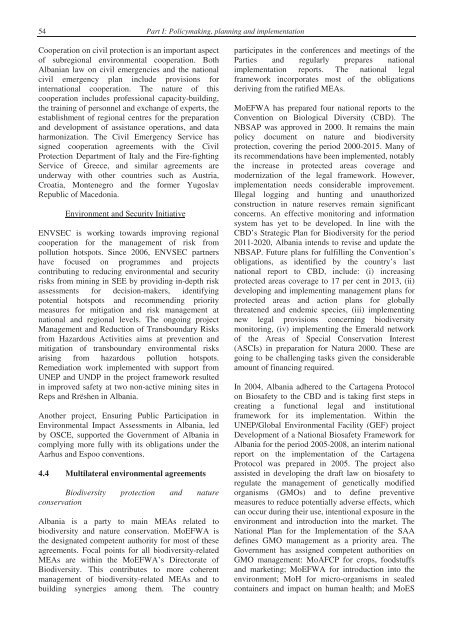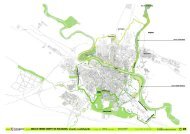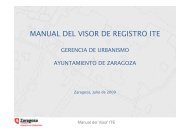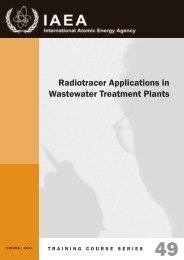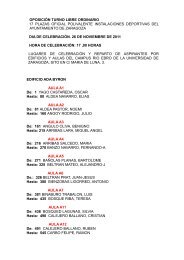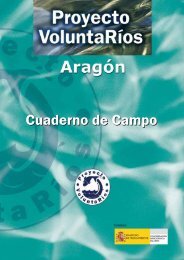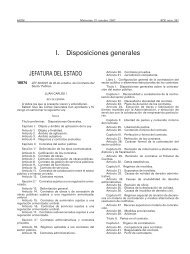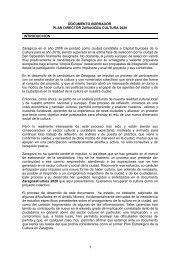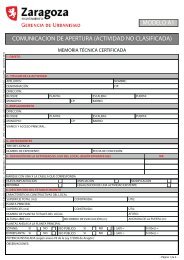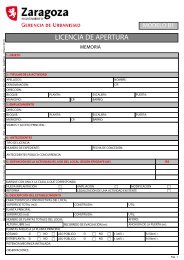Chapter 4: Implementation <strong>of</strong> international agreements and commitments53instrument for the implementation <strong>of</strong> the jointStrategic Action Plan regarding the lake. The LakeShkoder Commission was established in 2009.A successful example <strong>of</strong> cooperation in the region isthe Transboundary Prespa Park, launched in 2000.The Prespa Park Coordination Committee includesthe Government, local society and NGO participationfrom the three countries – <strong>Albania</strong>, the formerYugoslav Republic <strong>of</strong> Macedonia and Greece, as wellas a MedWet/Ramsar observer, and promotes jointwater management. Even if, in this case, theeffectiveness <strong>of</strong> cooperation is hampered by the lack<strong>of</strong> a trilateral agreement with binding provisions andclearly stated obligations for the three statesconcerned, informal arrangements can also produceresults.Work coordinated by the Committee (acting as a nonlegalentity) has led to the joint preparation <strong>of</strong> astrategic action plan, adopted in 2004. An <strong>of</strong>ficialagreement on the Protection and SustainableDevelopment <strong>of</strong> the Prespa Park was signed by theEnvironment Ministers <strong>of</strong> the three countries and theEU Environment Commissioner in 2010.Many challenges in cross-border cooperation stillexist with regard to the management <strong>of</strong> the DriniRiver basin that covers a geographical area including<strong>Albania</strong>, Greece, Montenegro, the former YugoslavRepublic <strong>of</strong> Macedonia, and Kosovo (UNadministeredregion, Security Council resolution1244). The Drini River basin is being managedthrough different and <strong>of</strong>ten inconsistent nationalmanagement approaches, resulting in degradation <strong>of</strong>natural values as well as considerable pollution.Recently, UNECE and the Global Water PartnershipMediterranean have engaged ministries withresponsibilities for water management, joint bodiesand other stakeholders in a structured and openconsultation process to improve cooperation and jointmanagement <strong>of</strong> the extended Drini River basin, usingthe platform <strong>of</strong> the UNECE Convention on theProtection and Use <strong>of</strong> Transboundary Watercoursesand International Lakes and the Petersberg PhaseII 7 /Athens Declaration Process 8 . On the <strong>Albania</strong>n6Ramsar Convention on Wetlands <strong>of</strong> InternationalImportance, especially Waterfowl Habitat7 The Petersberg Process, concerns also cooperation on themanagement <strong>of</strong> transboundary waters. The PetersbergProcess – Phase II is intended to provide support totranslate into action the current developments andopportunities for future cooperation on transboundaryriver, lake and groundwater management in SEE.8 The “Athens Declaration” concerning Shared Water,Shared Future and Shared Knowledge provides aside the key stakeholder is MoEFWA. The SharedStrategic Vision includes specific objectives in theshort, medium and long term and institutes the DrinCore Group with representation from all riparianauthorities to manage its implementation.Another example <strong>of</strong> the <strong>Albania</strong>n participation insubregional cooperation is the Dinaric Arc Initiative.The Initiative aims to establish a network <strong>of</strong>protected areas and support the conservation <strong>of</strong>biological diversity and the sustainable management<strong>of</strong> resources in SEE. It promotes collaboration amongthe countries <strong>of</strong> the region as well as localcommunity development. Subregional meetings havealready taken place with support from theEnvironment and Security Initiative (ENVSEC) andUNEP in order to initiate discussion and facilitatefuture consultations on the potential for establishing aregional network <strong>of</strong> protected areas in theBalkans/Dinaric Arc region.Other transboundary projects include connecting theprotected areas <strong>of</strong> Korabi Protected Landscape in<strong>Albania</strong>, Mavrovo National Park and the planned ŠarPlanina National Park in the former YugoslavRepublic <strong>of</strong> Macedonia, and Mali Sharr NationalPark in Serbia, as well as strengthening cross-bordercooperation and establishing a large internationalpark in the region <strong>of</strong> Bjeshket e Namuna/Prokletije(<strong>Albania</strong>, Montenegro and Serbia). The projectCross-border Cooperation through <strong>Environmental</strong>Planning and Investment assisted stakeholders fromthe cross-border area Debar and Peshkopia in<strong>Albania</strong> in addressing common environmentalproblems. Through training and workshops, localgovernments and utility experts from across theborder region were supported to develop the skillsneeded to identify and prepare environmentalinvestment projects for financing.Other partnershipsBilateral and trilateral environmental agreements andmemoranda <strong>of</strong> understanding have been signed withCroatia, the Czech Republic, Denmark, Greece, Italy,Montenegro, Spain, Sweden, the former YugoslavRepublic <strong>of</strong> Macedonia, and Kosovo (UNadministeredregion, Security Council resolution1244). Cross-border cooperation also takes placeunder programme component II <strong>of</strong> IPA, whichincludes environmental aspects.framework for a long-term process to support cooperativeactivities for the management <strong>of</strong> shared water resources inthe SEE and Mediterranean regions.
54 Part I: Policymaking, planning and implementationCooperation on civil protection is an important aspect<strong>of</strong> subregional environmental cooperation. Both<strong>Albania</strong>n law on civil emergencies and the nationalcivil emergency plan include provisions forinternational cooperation. The nature <strong>of</strong> thiscooperation includes pr<strong>of</strong>essional capacity-building,the training <strong>of</strong> personnel and exchange <strong>of</strong> experts, theestablishment <strong>of</strong> regional centres for the preparationand development <strong>of</strong> assistance operations, and dataharmonization. The Civil Emergency Service hassigned cooperation agreements with the CivilProtection Department <strong>of</strong> Italy and the Fire-fightingService <strong>of</strong> Greece, and similar agreements areunderway with other countries such as Austria,Croatia, Montenegro and the former YugoslavRepublic <strong>of</strong> Macedonia.Environment and Security InitiativeENVSEC is working towards improving regionalcooperation for the management <strong>of</strong> risk frompollution hotspots. Since 2006, ENVSEC partnershave focused on programmes and projectscontributing to reducing environmental and securityrisks from mining in SEE by providing in-depth riskassessments for decision-makers, identifyingpotential hotspots and recommending prioritymeasures for mitigation and risk management atnational and regional levels. The ongoing projectManagement and Reduction <strong>of</strong> Transboundary Risksfrom Hazardous Activities aims at prevention andmitigation <strong>of</strong> transboundary environmental risksarising from hazardous pollution hotspots.Remediation work implemented with support fromUNEP and UNDP in the project framework resultedin improved safety at two non-active mining sites inReps and Rrëshen in <strong>Albania</strong>.Another project, Ensuring Public Participation in<strong>Environmental</strong> Impact Assessments in <strong>Albania</strong>, ledby OSCE, supported the Government <strong>of</strong> <strong>Albania</strong> incomplying more fully with its obligations under theAarhus and Espoo conventions.4.4 Multilateral environmental agreementsBiodiversity protection and natureconservation<strong>Albania</strong> is a party to main MEAs related tobiodiversity and nature conservation. MoEFWA isthe designated competent authority for most <strong>of</strong> theseagreements. Focal points for all biodiversity-relatedMEAs are within the MoEFWA’s Directorate <strong>of</strong>Biodiversity. This contributes to more coherentmanagement <strong>of</strong> biodiversity-related MEAs and tobuilding synergies among them. The countryparticipates in the conferences and meetings <strong>of</strong> theParties and regularly prepares nationalimplementation reports. The national legalframework incorporates most <strong>of</strong> the obligationsderiving from the ratified MEAs.MoEFWA has prepared four national reports to theConvention on Biological Diversity (CBD). TheNBSAP was approved in 2000. It remains the mainpolicy document on nature and biodiversityprotection, covering the period 2000-2015. Many <strong>of</strong>its recommendations have been implemented, notablythe increase in protected areas coverage andmodernization <strong>of</strong> the legal framework. However,implementation needs considerable improvement.Illegal logging and hunting and unauthorizedconstruction in nature reserves remain significantconcerns. An effective monitoring and informationsystem has yet to be developed. In line with theCBD’s Strategic Plan for Biodiversity for the period2011-2020, <strong>Albania</strong> intends to revise and update theNBSAP. Future plans for fulfilling the Convention’sobligations, as identified by the country’s lastnational report to CBD, include: (i) increasingprotected areas coverage to 17 per cent in 2013, (ii)developing and implementing management plans forprotected areas and action plans for globallythreatened and endemic species, (iii) implementingnew legal provisions concerning biodiversitymonitoring, (iv) implementing the Emerald network<strong>of</strong> the Areas <strong>of</strong> Special Conservation Interest(ASCIs) in preparation for Natura 2000. These aregoing to be challenging tasks given the considerableamount <strong>of</strong> financing required.In 2004, <strong>Albania</strong> adhered to the Cartagena Protocolon Biosafety to the CBD and is taking first steps increating a functional legal and institutionalframework for its implementation. Within theUNEP/Global <strong>Environmental</strong> Facility (GEF) projectDevelopment <strong>of</strong> a National Biosafety Framework for<strong>Albania</strong> for the period 2005-2008, an interim nationalreport on the implementation <strong>of</strong> the CartagenaProtocol was prepared in 2005. The project alsoassisted in developing the draft law on biosafety toregulate the management <strong>of</strong> genetically modifiedorganisms (GMOs) and to define preventivemeasures to reduce potentially adverse effects, whichcan occur during their use, intentional exposure in theenvironment and introduction into the market. TheNational Plan for the Implementation <strong>of</strong> the SAAdefines GMO management as a priority area. TheGovernment has assigned competent authorities onGMO management: MoAFCP for crops, foodstuffsand marketing; MoEFWA for introduction into theenvironment; MoH for micro-organisms in sealedcontainers and impact on human health; and MoES
- Page 1 and 2:
UNITED NATIONS ECONOMIC COMMISSION
- Page 6 and 7:
vPrefaceThe second EPR of Albania b
- Page 8 and 9:
viiLIST OF TEAM MEMBERSMr. Antoine
- Page 10 and 11:
ixMinistry of Agriculture, Food and
- Page 12 and 13:
xiCONTENTSForeword ................
- Page 14 and 15:
8.3 Biological diversity ..........
- Page 16 and 17:
xvPageChapter 8Table 8.1:Table 8.2:
- Page 18 and 19:
xviiPageLIST OF PHOTOSIntroductionP
- Page 20 and 21:
xixLIST OF ABBREVIATIONSAICASCICANP
- Page 22 and 23:
xxiSIGNS AND MEASURES .. not availa
- Page 24 and 25:
xxiiiExecutive summaryThe first Env
- Page 26 and 27:
The entire education system is subj
- Page 28 and 29:
was done by international consultan
- Page 30 and 31:
1Introduction I.1 Physical contextA
- Page 32 and 33: Introduction3The country has deposi
- Page 34 and 35: Introduction5Photo I.1: Ruins of Sk
- Page 36: PART I: POLICYMAKING, PLANNING AND
- Page 39 and 40: 10 Part I: Policymaking, planning a
- Page 41 and 42: 12 Part I: Policymaking, planning a
- Page 43 and 44: 14 Part I: Policymaking, planning a
- Page 45 and 46: 16 Part I: Policymaking, planning a
- Page 47 and 48: 18 Part I: Policymaking, planning a
- Page 49 and 50: 20 Part I: Policymaking, planning a
- Page 51 and 52: 22 Part I: Policymaking, planning a
- Page 53 and 54: 24 Part I: Policymaking, planning a
- Page 55 and 56: 26 Part I: Policymaking, planning a
- Page 57 and 58: 28 Part I: Policymaking, planning a
- Page 59 and 60: 30 Part I: Policymaking, planning a
- Page 61 and 62: 32 Part I: Policymaking, planning a
- Page 63 and 64: 34 Part I: Policymaking, planning a
- Page 65 and 66: 36 Part I: Policymaking, planning a
- Page 67 and 68: 38 Part I: Policymaking, planning a
- Page 69 and 70: 40 Part I: Policymaking, planning a
- Page 71 and 72: 42 Part I: Policymaking, planning a
- Page 73 and 74: 44 Part I: Policymaking, planning a
- Page 75 and 76: 46 Part I: Policymaking, planning a
- Page 77 and 78: 48 Part I: Policymaking, planning a
- Page 79 and 80: 50 Part I: Policymaking, planning a
- Page 81: 52 Part I: Policymaking, planning a
- Page 85 and 86: 56 Part I: Policymaking, planning a
- Page 87 and 88: 58 Part I: Policymaking, planning a
- Page 89 and 90: 60 Part I: Policymaking, planning a
- Page 91 and 92: 62 Part I: Policymaking, planning a
- Page 93 and 94: 64 Part I: Policymaking, planning a
- Page 96 and 97: 67Chapter 5ECONOMIC INSTRUMENTS AND
- Page 98 and 99: Chapter 5: Economic instruments and
- Page 100 and 101: Chapter 5: Economic instruments and
- Page 102 and 103: Chapter 5: Economic instruments and
- Page 104 and 105: Chapter 5: Economic instruments and
- Page 106 and 107: Chapter 5: Economic instruments and
- Page 108: PART III: INTEGRATION OF ENVIRONMEN
- Page 111 and 112: 82 Part III: Integration of environ
- Page 113 and 114: 84 Part III: Integration of environ
- Page 115 and 116: 86 Part III: Integration of environ
- Page 117 and 118: 88 Part III: Integration of environ
- Page 119 and 120: 90 Part III: Integration of environ
- Page 121 and 122: 92 Part III: Integration of environ
- Page 124 and 125: 95Chapter 7WASTE MANAGEMENT7.1 Intr
- Page 126 and 127: Chapter 7: Waste management97sold f
- Page 128 and 129: Chapter 7: Waste management99SitesC
- Page 130 and 131: Chapter 7: Waste management101Table
- Page 132 and 133:
Chapter 7: Waste management103• C
- Page 134 and 135:
Chapter 7: Waste management105sever
- Page 136:
Chapter 7: Waste management107(b) E
- Page 139 and 140:
110 Part III: Integration of enviro
- Page 141 and 142:
112 Part III: Integration of enviro
- Page 143 and 144:
114 Part III: Integration of enviro
- Page 145 and 146:
116 Part III: Integration of enviro
- Page 147 and 148:
118 Part III: Integration of enviro
- Page 149 and 150:
120 Part III: Integration of enviro
- Page 151 and 152:
122 Part III: Integration of enviro
- Page 153 and 154:
124 Part III: Integration of enviro
- Page 155 and 156:
126 Part III: Integration of enviro
- Page 157 and 158:
128 Part III: Integration of enviro
- Page 159 and 160:
130 Part III: Integration of enviro
- Page 161 and 162:
132 Part III: Integration of enviro
- Page 164 and 165:
135Chapter 10HUMAN HEALTH AND ENVIR
- Page 166 and 167:
Chapter 10: Human health and enviro
- Page 168 and 169:
Chapter 10: Human health and enviro
- Page 170 and 171:
Chapter 10: Human health and enviro
- Page 172 and 173:
Chapter 10: Human health and enviro
- Page 174 and 175:
Chapter 10: Human health and enviro
- Page 176 and 177:
Chapter 10: Human health and enviro
- Page 178:
Chapter 10: Human health and enviro
- Page 182 and 183:
153Annex IIMPLEMENTATION OF THE REC
- Page 184 and 185:
The new 2011 Law on Environmental P
- Page 186 and 187:
Recommendation 3.2:Albania needs to
- Page 188 and 189:
Recommendation 4.2:The Ministry of
- Page 190 and 191:
for 2004 was prepared within the St
- Page 192 and 193:
163Chapter 6: WATER MANAGEMENTRecom
- Page 194 and 195:
There is no updated water resources
- Page 196 and 197:
international consulting and author
- Page 198 and 199:
it is limited only to the level of
- Page 200 and 201:
taken. In addition, NES2, under MoE
- Page 202 and 203:
173Chapter 12: HUMAN HEALTH AND THE
- Page 204:
Recommendation 12.5:(a) The Ministr
- Page 207 and 208:
178Worldwide agreementsYear1979 (BO
- Page 210 and 211:
181Annex IIISELECTED ECONOMIC AND E
- Page 212 and 213:
183Land resources and soil 2002 200
- Page 214:
Education 2002 2003 2004 2005 2006
- Page 217 and 218:
188Law on Local Tax System, No. 963
- Page 220 and 221:
191SourcesIndividual authors1. Bego
- Page 222 and 223:
19336. Albania, Ministry of Environ
- Page 224 and 225:
19568. National Agency of Natural R
- Page 226 and 227:
197101. International POPs Eliminat
- Page 228 and 229:
199UNDP and Ministry of Environment
- Page 230:
201172. National Agency for Environ


